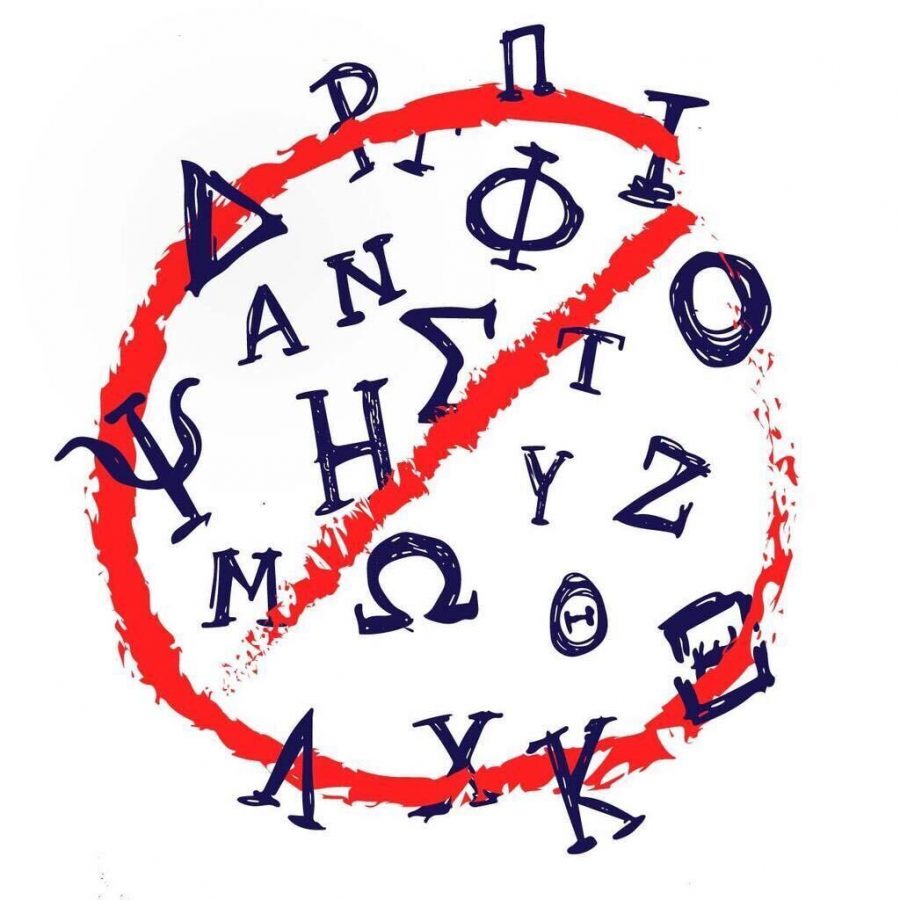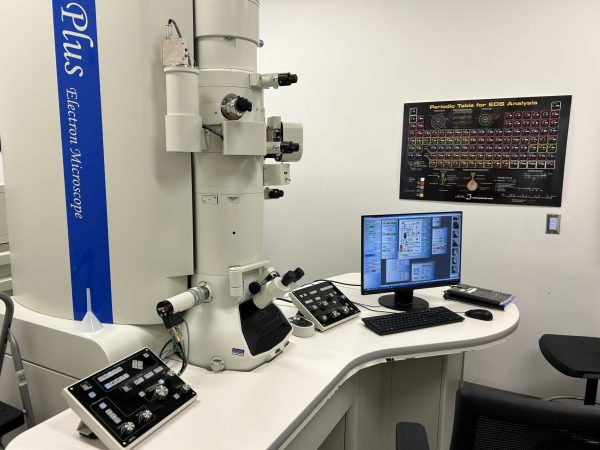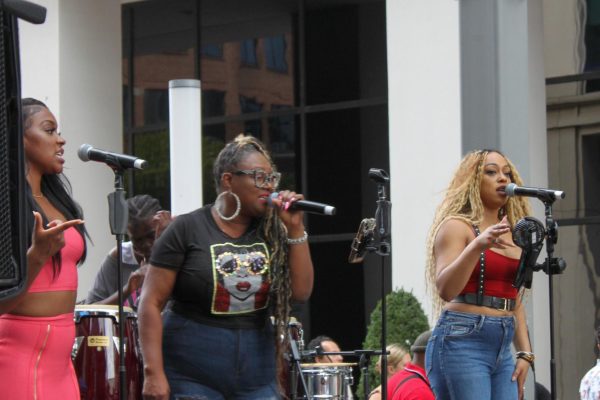Racism, sexism, and abolition: a modern Greek tragedy
Reports of racist incidents and sexual misconduct connected to fraternities and sororities on anonymous Instagram pages have led many students to disaffiliate from their organizations and some to call for abolishing Greek Life.
Content warning: This article mentions topics such as sexual assault, harassment, racism and rape.
When the admin of the Instagram page @exposingauabusers first created the account for American University students to post anonymous submissions about their experiences with sexual assault and harassment, they expected to receive “five or six” submissions.
Instead, they received over 1,000.
“It’s a systemic issue at AU, and AU is actively doing everything they can to make sure that larger implication isn’t released to prospective students,” said the @exposingauabusers admin, who asked to remain anonymous to protect their identity as the owner of a page that posts allegations against people.
Another anonymously-run Instagram page, @blackatamericanuniversity, which publishes personal accounts of Black students and students of color about their experiences with racism on campus, has received over 220 submissions.
Both accounts share a significant number of posts about the actions of fraternity and sorority members, causing some students to call for their abolition and others to disaffiliate, including former American University Student Government President and former Sigma Phi Epsilon member Nikola Jok.
“I feel like it’s gotten to the point where when it comes to rape, sexual assault, racism and hazing, I feel like AU just needs to be more involved in what happens and what goes on,” said the @blackatamericanuniversity admin, who also asked to remain anonymous to protect their identity as the owner of a page posting allegations against people.
The movement to abolish Greek life is not unique to AU. Similar calls on social media have been made at the University of Southern California, Vanderbilt University and the University of Richmond, among others. Several studies on Greek life have pointed out that the organizations are rooted in historically racist policies and membership is linked to higher instances of sexual assault.
Some of these findings have been reflected in the anonymous submissions from AU students detailing their experiences with racism, sexual abuse and harassment by members of Greek life.
The AU community’s response to the posts and the dialogue they prompted included all members of the AU chapter of the Delta Tau Delta fraternity disaffiliating June 29, as well as many members of the Phi Sigma Sigma and Alpha Xi Delta sorority chapters at AU.
A coalition calling to abolish social Greek life at AU has garnered 1,342 signatures on its petition. The coalition’s demands include a ban on future recruitment for Panhellenic and Interfraternity Council organizations at AU, the resignation of Greek life members currently in executive positions in AUSG and the prevention of Greek members from running in future elections.
One of the leading members of the coalition, Halle Jaymes, said her own experience was part of why she felt the coalition was necessary. She was sexually assaulted by a fraternity brother at AU and had friends in sororities who continued to be friends with him after the incident.
“Part of why I don’t believe that reform is possible is the complicitness I’ve seen within the system itself,” said Jaymes. “I know firsthand that people I have been friends with, who claim to care about sexual assault and racism and even have it in their organization’s philanthropy, don’t actually step up and do anything about it.”
‘A symptom of systemic rape culture’
The admin of the @exposingauabusers page is a survivor of sexual assault. They said they felt they were “a minority who had fallen through the cracks of AU’s perfect system” before they began the page — then the huge number of posts showed them it was a systemic issue instead.
The admin, who took a hiatus in mid-July after receiving multiple threats of legal action from “anonymous and non-anonymous accounts,” said they were not surprised by the number of fraternities and sororities mentioned in their posts, as their assaulter was in a fraternity. They said that speaks to a larger issue of privilege in the system of Greek life that needs to be addressed.
“If it’s impossible to truly treat the root cause, it’s a step forward to treat the symptoms of it, and Greek life is definitely a symptom of systemic rape culture in America,” said the admin.
The admin said they had a good experience with the Office of Advocacy Services for Interpersonal and Sexual
Violence, known as OASIS, but didn’t feel Title IX would have been helpful for their specific case. They said they have received hundreds of direct messages from students who had negative experiences with the Title IX office at AU and feel there is a systemic issue there as well.
“If Title IX operated the way that it should, and it clearly isn’t, there would be no need for our account,” they said.
Jaymes went through the Title IX process for her case but said she felt it only forced her to relive her trauma without any real results. She was referred to OASIS but found that experience to be even worse.
“When it comes to something as traumatic and disturbing as sexual assault, I’m not looking to go into a dimly lit room with rain noise in the background while some lady with a hot pink notebook asks me to tell her what happened to me and offers me a lollipop” she said. “It’s so inappropriate and I think that there’s such a lack of understanding among this administration of what sexual assault is and what it does to people.”
AU created a new office called the Office of Equity and Title IX that will launch Aug. 14, when the new Title IX rules from the U.S. Department of Education go into effect. According to an email announcement from President Sylvia Burwell, the office is designed “to dismantle structural racism, eliminate gender-based violence, support survivors, and address barriers that prevent members of our community from full participation and access.” The office is also part of the university’s implementation of the new Title IX rules, which allow cross-examination of both people who report sexual assault and the accused, and narrow the definition of sexual harassment.
Both Jaymes and the admin of @exposingaubusers said the office should collaborate with survivors of sexual assault.
The admin said they know AU is struggling with financial losses from COVID-19 and damage to the school’s image from pages like theirs but worries the “hasty solution” of creating a new office could potentially overlook some of the “deeply rooted” issues.
AU Communications provided comment about the new office over email: “The new Equity and Title IX office will be responsible for addressing and responding to sexual harassment, sexual misconduct, and discrimination in the community. … The new office and new [assistant vice president] will be consulting widely with students, as well as faculty and staff, about the work of the office and AU’s work in this area, including training and prevention efforts, once they start.”
Prevention measures by IFC and Panhellenic
The only mention of sexual assault in the AU Interfraternity Council Constitution reads: “We will respect the dignity of all persons; therefore, we will not physically, mentally, psychologically or sexually abuse or harm any human being.”
According to Jack Nusenow, a junior at AU and former member of Delta Tau Delta, AU requires new members of fraternities to attend at least three events hosted by OASIS, the Center for Diversity and Inclusion, the Center for Advocacy and Student Equity or a similar campus center as part of their new-member education.

Simon Lux, another junior and former member of Delta Tau Delta, said the enforcement of this is largely up to the fraternity members themselves.
“I highly doubt that some members of other organizations are seeing that mandate and actually fulfilling it,” he said. “And I highly doubt that AU is actually cracking down on people not doing so.”
The national Delta Tau Delta organization also mandates new members to take classes on sexual violence and abuse of drugs and alcohol, according to Nusenow.
The North-American Interfraternity Conference Standards in the Judicial Affairs Officer Guide says that fraternities must have “risk management policies address alcohol use, fire safety, hazing, and sexual assault/abuse.”
It also states “each member organization will communicate the importance of its undergraduate students in participating in educational programs,” with one of the topics being sexual assault awareness/prevention. It does not state whether these programs are required.
The North-American Interfraternity Conference Standards do not provide any information on dealing with racism with fraternity organizations.
The AU Panhellenic Association Bylaws, which oversees sororities, require organizations to schedule one “wellness oriented” training per semester to educate members about sexual assault, which is led by an AU student or “a trainer who has been appointed and trained by the Wellness Center.”
Becky Crosby, a senior and a former member of Phi Sigma Sigma, said her sorority had diversity and inclusion meetings every semester, but sexual assault meetings only happened every few years.
Crosby said Phi Sigma Sigma discussed safety measures before events and had “sober sisters,” which are designated members of the sorority who don’t consume alcohol at events, to help prevent sexual assault and harassment.
Once the @exposingauabusers page was created and gained traction, many members of the sorority came forward with their own experiences, Crosby said.
“Not only were these [incidents of sexual assault and harassment] not being prevented, they were being ignored,” Crosby said.
Crosby said that she went to the board of her sorority about the prevalence of sexual assault and harassment at events, but nothing happened.
“It was quite obvious that when these incidents started coming up that it was very upsetting to members who didn’t know, because, obviously, we wouldn’t have joined if we knew experiences like this were happening and just kind of being swept under the rug,” Crosby said.
The Phi Sigma Sigma chapter at AU did not respond to requests for comment.
Racism in Greek life
The admin of the Instagram page @blackatamericanuniversity said they weren’t surprised by the amount of submissions that included Greek life organizations, and they have experienced racism through Greek life themselves.
“Obviously [racism] is blatant in some senses, but most of it is very subtle and passive aggressive where I feel like you wouldn’t notice it if you weren’t experiencing it,” the @blackatamericanuniversity admin said.
They said they noticed frat parties were quick to let any girls in, but women of color had a harder time getting in compared to white women.
“Just seeing the submissions just kind of confirmed everything I thought in the first place,” they said.
When addressing how AU handles racism within Greek organizations, the admin said the organizations have too much power and more regulations are needed. For there to be change, the admin said AU needs to address underlying issues and be straightforward.
“Your stance should be against racism; your stance should be against sexual assault,” they said. ‘It shouldn’t be very vague where you don’t really know where they stand. It should be a pretty strong stance.”
AU has not released a school wide statement regarding @blackatamericanuniversity.
Disaffiliation from a system that “perpetuates misogyny and assault”
Lux and Nusenow both said they didn’t want to be “complicit” in the Greek life system, which formed their decision to disaffiliate from Delta Tau Delta. Before the anonymous Instagram accounts exposed so many incidents, Nusenow said he had thought their fraternity “was one of the good ones.”
“In reality, our participation in the Greek life system perpetuates misogyny and assault,” Lux said. “I used to pay dues to an organization which functions nationally, and in that national organization, there are abusers.”
Nusenow said the former members received messages from advisors, alumni and the CEO of the national Delta Tau Delta organization and described them as saying that the former members were “shirking their responsibility to reform” and disagreed with their decision to disaffiliate.
The AU chapter of Delta Tau Delta took down the Instagram post announcing their mass disaffiliation after the national organization gave them a cease and desist letter and ordered them to yield all chapter social media accounts to the chapter advisor, as reported by The Eagle.
The national Delta Tau Delta organization did not respond to requests for comment.
The national organization intends to recruit new members into the AU chapter, but Lux said that will be an expensive and time-consuming effort, as the national organization will have to hire non-students to recruit on campus.
AU’s Alpha Xi Delta chapter posted a statement July 1 on their Instagram account announcing the executive board’s decision to step down in response to allegations against their sorority and Greek life as a whole.
Maddie Danberger, a sophomore and former member of Alpha Xi Delta, said when these Instagram posts about racism and sexual assault surfaced, members of the sorority spoke out against racism within their organization but were silenced by their national organization.
The national chapter asked members not to hold meetings to discuss issues surrounding racism and sexual assault “on the premise that they wanted to save face,” Danberger said, which caused many members to disaffiliate.
“I think the biggest thing was just that female Greek life, on the surface, tells people that it promotes female empowerment.”Danberger said.“And yet, when we had women that wanted to bring awareness to that, they basically didn’t allow us to do that. And so that was, for me and for most women in the organization, one of the biggest deciding factors was that experience.”
The national Alpha Xi Delta organization did not respond to requests for comment.
The @exposingauabusers admin said the large numbers of students disaffiliating from Greek life is not necessarily helpful because some may see it “as trying to cover loose ends, so you don’t get called out.” While disaffiliation is a genuine move for many, they said there is a “huge part of performance in it.”
The admin said it was important for former members of Greek life to still be held accountable for past actions and complicity, and that just because an organization does not exist anymore, the trauma it may have caused can’t be erased.
Abolishing Greek life could lead to the same issue of covering past trauma, they said, and isn’t a final solution. Members within Greek organizations have been harmed by issues perpetuated by the system as well, they said.
Alfredo Chapman, a senior and current vice president of the Phi Sigma Kappa fraternity at AU, said over email that he believes everyone has a right to their personal decision to disaffiliate from a Greek life organization and supports those who do.
Chapman said he agrees Greek life is problematic but abolishing it at AU is a blanket solution of a larger issue in that “clubs, sports teams, and even friend groups at AU can have the same dynamic as a Greek organization.”
As a minority who “does not come from a wealthy background,” Chapman said the argument that Greek life is classist and exclusive is a wider issue at AU, as a predominantly white institution.
“More so, I think the potential of some frats going underground creates far much more risk and less accountability in regard to many of these issues,” Chapman said over email.
AU administration and national organizations respond
In a response about the call to abolish Greek life at AU, AU Communications told AWOL over email that the IFC will begin asking organizations to submit policies detailing how they will handle incidents of sexual violence and, it will require workshops in diversity and sexual violence. The IFC plans to implement “new judicial sanctions” to enforce these rules.
The response also said the Panhellenic Council will provide programming and education once a semester to prevent abuse and support survivors.
Dani Weatherford, CEO of the National Panhellenic Conference, said over email that a national framework has been created to improve engagement about race and systematic racism. Weatherford also said many NPC organizations are removing legacy policies, which are preferences given by sororities to prospective members with alumni relatives and can lead to perpetuated exclusion of women of color.
“National organizations are listening and largely believe that the advocacy seen at American and elsewhere has the potential to drive real and important reforms,” Weatherford said over email.
The North-American Interfraternity Conference responded in a statement over email that they support reporting racism and misconduct on campus. They encouraged “collaboration between all stakeholders” to improve campus safety while also allowing students “to form lawful associations that align with core institutional values.”
“Abolishing fraternities is not the answer to addressing cultural challenges on campus,” said the NIC over email. “The vast majority of students involved in fraternities want to work through their organizations to improve campus culture by enhancing diversity, inclusion and respect for all students.”
In response to the @exposingauabusers page, AU released a statement June 26 encouraging victims to file a complaint with the Title IX office.
“We also ask members of our community to be thoughtful about social media posts and understand their possible impact and unintended consequences. They could negatively affect others, including survivors, who may not wish to have their experiences made public or potentially spread incomplete information,” the statement said.
In terms of the goal of their page, the @exposingauabusers admin said: “The point of our account isn’t to punish people who have been accused of sexual violence. It’s for people to just start talking about it. …All we’re asking is for people to start talking about how sexual assault doesn’t look like how it looks on TV all the time.”
If you are a survivor of sexual assault, harassment or racism and want to share your story, reach out to us at [email protected]. For more information on how to contact us anonymously, click here.
Shannon Durazo contributed to reporting for this story.

Katherine Long (she/her) is a senior from Southern California majoring in journalism with a minor in international studies. With a focus on investigative...

Grace Vitaglione (she/her/hers) is a junior from West Virginia studying journalism at American University, with minors in Creative Writing and Spanish....









